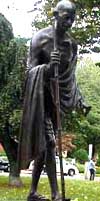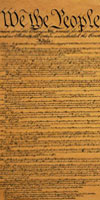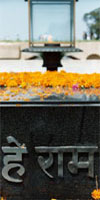
|
|
|
|
JULY 8, 2004 FOR IMMEDIATE RELEASE Congressional Forum Highlights Implications of India's Recently Held Elections Congressman Jim McDermott (D,WA-7), in cooperation with Young India and the India Caucus, hosted an event July 7th on Capitol Hill that brought together a distinguished panel to analyze the recently held parliamentary elections in India. The event focused on policy implications for Indo-US relations, security in South Asia, trade and further explored the socio-political landscape of the world’s largest democracy. Congressman McDermott (D, WA-7) opened the event sharing his reflections from his recently concluded trip to India. Talking of the elections he commented how in his interactions with the new government’s leaders they expressed their surprise at how they won so dramatically and how the BJP lost. The Congressman, an avid follower of Indian politics, confessed that the election results left him perplexed. Congressman McDermott (D, WA-7) thanked Young India for bringing this briefing idea to his office’s attention. Congressman Joe Wilson (R, SC-2), a co-chair of the India Caucus, shared his excitement at the organizing of the briefing. He thanked Young India and its President, Rohit Tripathi for its continued efforts in the spirit of Mahatma Gandhi. Congressman Wilson (R, SC-2) was gracious in his words for the Indian-American community and an epitome of optimism looking at the future of Indo-US relations. Ambassador Karl F. Inderfurth, former Assistant Secretary of State for South Asia and current Director of the International Affairs Program at GW University’s Elliott School of International Affairs provided penetrating insight into the implications of the recent elections. The Ambassador was optimistic that the new government would not only carry forward the initiatives with Pakistan, undertaken under Prime Minister Vajpayee’s leadership, but would also find ways to enhance them. Drawing attention to recent diplomatic activities between the two neighbors he asserted that talks of CBM’s, a continued moratorium on nuclear testing and an agreement to fully staff their embassies were all promising signs. The Ambassador was pleased with Mr. Shaukat Aziz being picked as the next Pakistani Prime Minister. He found the prospects of Indo-Pak relations “intriguing” with two leaders coming from the financial world. On account of Indo-US relations he stressed that US policymakers should have relations with both India and Pakistan on their merits. He said that India should not be seen as a hedge against China, and US policy-makers must strive to make this a partnership of equals as opposed to the perception of India being a subordinate. Dr. Arvind Panagariya, Jagdish Bhagwati Professor of Indian Political Economy at Columbia University, started off by saying that he had a “different take” on the election results. In contrast with a perceived revolt against globalization he said that due to the liberalizing reforms the statistics showed a clear drop in poverty levels over the last two decades. He was skeptical of the theory of a new rural-urban divide as a reason for the latest results. He saw the anti-incumbency factor more dominant in determining the outcome of the elections. Dr.Panagariya said that a “revolution of rising expectations” is in the works and that was a component in the anti- incumbency factor. He had mixed feelings on the prospects of the new government although the economic survey report was comforting to him. The economist from Columbia University stressed the policy need to move an agrarian society towards industrialization to sustain growth levels and meet employment demands. He concluded by saying that the government’s Budget will provide a better picture of its economic gameplan. Mr. Rohit Tripathi of Young India brought the audience’s attention to some electoral facts that shed light on the current state of India’s democracy. He started out by contending the national trend or rumblings thereof were one of greater local control over political and economic matters. He pointed to the failure of political parties to realize this trend. Mr.Tripathi said that these elections did not mean an end to communal tensions. He noted the right-ward movement of the BJP at its recently held national executive. He said he sincerely hoped that the moderates in the BJP would assert themselves as their service is critical for the nation. Mr.Tripathi hoped that the Indo-Pak dialogue underway incorporates the common citizens of Kashmir – all communities. He expressed his desire for the Indian American community to play a more active political role. Mr.Tripathi concluded by saying the parity in relations with the US can only be achieved through greater interaction between Indian and American policymakers and activists. Mr.Tripathi’s remarks were followed by a brief Q&A session. |
    | |||||||||||||||||||||||||||
| © 2000-2007 Young India, Inc. All rights reserved. |


